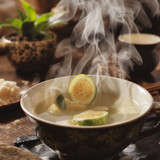

Starwest Botanicals
Organic White Tea Bags
White Tea Bags vs. Green Tea: Why They’re Different White tea and green tea come from the same plant—Camellia sinensis—but they’re made differently. That difference in processing is why white tea...
Chuan Lian Zi, also known as Melia Fruit or Pagoda Tree Fruit, is a treasured herb in Traditional Chinese Medicine (TCM) celebrated for its ability to regulate Qi, relieve pain, support digestive health, and balance emotional well-being. Sourced from the prized Melia toosendan tree, Chuan Lian Zi has been used for centuries to harmonize liver energy, ease abdominal discomfort, promote urinary health, and calm the spirit. Modern herbalists and researchers recognize its natural alkaloids and phytochemicals for powerful anti-inflammatory, antimicrobial, and analgesic benefits.
Whether you're seeking natural solutions for digestive issues, emotional tension, or urinary balance, Chuan Lian Zi offers time-tested support. Explore the rich history, health benefits, scientific insights, and safe usage of Pagoda Tree Fruit — and experience how this ancient remedy continues to nourish wellness in today's world.
Pure, lab-tested, and trusted by practitioners for generations — discover the highest-quality Chuan Lian Zi to support your holistic health journey.
| Health Benefits | Why It Works (Scientific & Modern Herbal Insight) | Chinese Theory (TCM View) |
|---|---|---|
| Relieves liver-related emotional tension | Contains natural alkaloids (like toosendanin) that regulate neurotransmitter activity, reducing stress and irritability | Soothes Liver Qi stagnation; disperses stagnant Liver energy to ease anger, frustration, and emotional imbalance |
| Alleviates abdominal pain and bloating | Exhibits anti-spasmodic and anti-inflammatory actions that relax intestinal muscles and improve digestion | Regulates Qi in the middle burner (Stomach and Spleen) to reduce pain and promote the smooth flow of Qi |
| Supports urinary tract health | Shows antimicrobial and anti-inflammatory properties that can help relieve mild urinary discomfort | Clears Damp-Heat from the Liver and Bladder channels to ease urinary difficulty and discomfort |
| Assists with parasite control | Natural insecticidal and antiparasitic compounds disrupt parasite life cycles | Expels parasites by transforming Dampness and Cold in the gastrointestinal system |
| Reduces minor skin irritations | Antibacterial and anti-inflammatory components may calm certain skin conditions when used externally | Dispels Damp-Heat from the skin and external layers of the body |

Common Names: Melia, Pagoda Tree Fruit, Szechuan Pagoda Tree Fruit, China Berry, Chinaberry, Bakayan, Chinese Scholar Tree Fruit, Japanese Pagoda Tree Fruit
Botanical Name: Meliae toosendan fructus, Styphnolobium japonicum, Melia azedarach
Chinese / Pin Yin Name: Chuan Lian Zi
Melia Dosage: Consult your healthcare provider for your correct dose.
Melia Precautions: Do not use if pregnant or nursing.

The melia tree (pagoda tree) is a flowering tree native to China. The fruit of the melia tree has a long history of medicinal use for a variety of health concerns. In traditional Chinese medicine melia promotes the flow of Qi, clears damp-heat, clears liver health, kills parasites ad regulates Qi. Research has found that melia contains compounds that aid in the reduction of inflammation, ease abdominal pain, and may aid in the expulsion of parasites such as tapeworms and roundworms. Melia benefits stomach health and supports a healthy immune system. Melia has analgesic anti-parasitic, anti-fungal and anti-inflammatory effects.
Melia can be used in a tea, decoction, or tincture. Melia powder is perfect to make your own fresh filler-free melia capsules.

Melia Herb Category: Herbs that Regulate Qi
Melia Properties: Bitter, Cold, Slightly toxic
Melia Channels / Meridians: Liver, Small Intestine, Stomach, Bladder
Melia Naturally Occurring Components: tridecane, toosendanin, neoazedarachinA, B, D, kulactone, β-Sitosterol,lipomelianyl 3-O-stearate
1. What is Chuan Lian Zi used for in Traditional Chinese Medicine (TCM)?
Chuan Lian Zi is traditionally used to regulate Liver Qi, relieve pain, clear Damp-Heat from the body, and expel parasites. It is commonly prescribed for abdominal pain, emotional stress, digestive discomfort, and urinary issues.
2. How does Chuan Lian Zi work to support emotional health?
Chuan Lian Zi contains natural compounds that help soothe the nervous system and regulate neurotransmitter balance. In TCM, it disperses stagnant Liver Qi, which is often linked to emotional symptoms like irritability, frustration, or depression.
3. Can Chuan Lian Zi help with digestive problems?
Yes, Chuan Lian Zi is known to relieve abdominal bloating, cramping, and discomfort by promoting the smooth flow of Qi and reducing inflammation in the gastrointestinal tract. It is especially useful when digestive issues are linked to emotional tension or Liver imbalance.
4. Are there any precautions or side effects when using Chuan Lian Zi?
Chuan Lian Zi should be used under professional guidance, as it can be slightly toxic in large doses. It is generally avoided during pregnancy, and people with very weak digestion (Spleen Qi deficiency) should use it cautiously. Always consult a qualified practitioner before use.
5. What are the active compounds in Chuan Lian Zi?
Chuan Lian Zi contains alkaloids like toosendanin and melianone, as well as bitter principles and triterpenoids. These compounds contribute to its anti-inflammatory, analgesic, antiparasitic, and antimicrobial properties, supporting its traditional and modern uses.
Corydalis Rehmannia Scutellaria Baicalensis Nutgrass Tribulus Fruit Goji Berry
References
http://alternativehealing.org/chuan_lian_zi.htm,
https://herbpathy.com/Uses-and-Benefits-of-Chuan-Lian-Zi-Cid1358
https://www.ncbi.nlm.nih.gov/pubmed/26383159
https://www.researchgate.net/publication/5467652_Anti-inflammatory_and_analgesic_activities_of_ethanolic_extract_and_two_limonoids_from_Melia_toosendan_fruit
https://www.americandragon.com/Individualherbsupdate/ChuanLianZi.html
https://pubmed.ncbi.nlm.nih.gov/24218970/